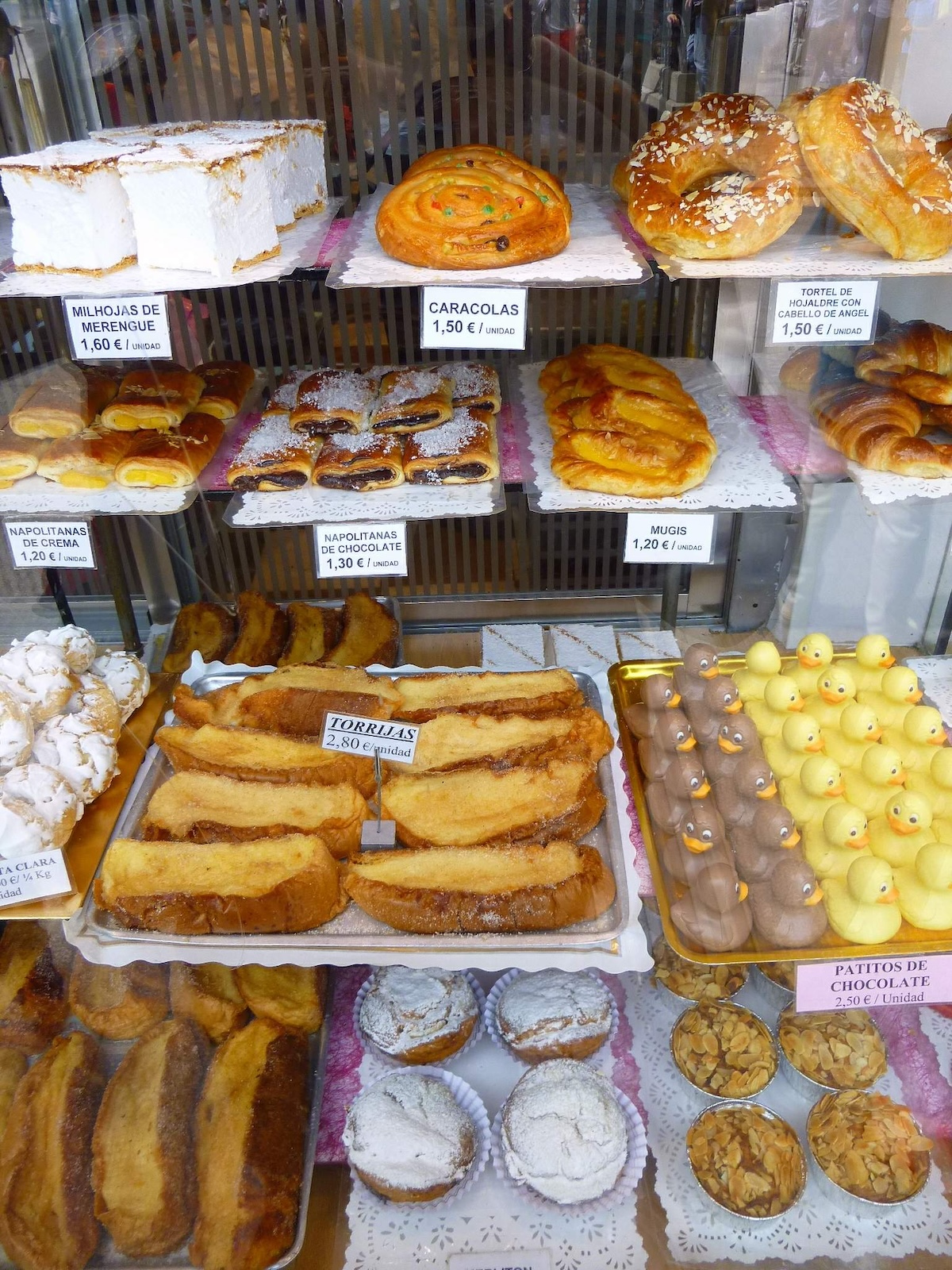Last Updated on December 22, 2025 by Emma Fajcz | Published: June 1, 2020
If you come to Seville at Easter, you’ll see bars throughout the city advertising “torrijas.”
These are a Semana Santa sensation, and locals won’t rest until they have their daily fix. Broadly speaking, you could call torrijas the Spanish version of French toast. But it’s so much more than that.
You’ll also see in them in other cities throughout Spain, but they are especially prominent in the south, and in Seville.
Let’s get into what torrijas are, and how to make them.

What are torrijas? Some myths, debunked
Firstly, torrijas aren’t just a breakfast food. You can eat these delicious treats anytime throughout the day.
Secondly, torrijas pack a lot more flavor than your average French toast. Sure, you might coat them in the same egg wash (with extra Spanish spice), but it doesn’t stop there. In Spain, our “French toast” is also dipped in sweet wine or honey, and then shallow-fried in olive oil. The resulting torrija is a decadent, syrupy treat that will put any French toast to shame!
If you love sweet treats, you’ll love torrijas. Photo credit: Eduardo
Torrijas during Roman times
It’s said that torrijas go back as far as Roman times. Given how much the Romans loved bread, wine, and olive oil, that wouldn’t be surprising. But torrijas really became a classic in the 16th century. Covents throughout Andalusia would use this recipe as a way to make use of stale bread. It was particularly popular during Lent, when this sweet toast was a valuable source of energy. According to some legends, women in labor would even be served torrijas to keep their energy up! After giving birth, they’d get another round of the sweet treat to restore them back to full health.
Today, they’re mostly seen in Andalusia during the weeks leading up to Easter. During Semana Santa, you can find them served at bars and cafes throughout the city, and even sold by different convents.
But if you can’t make it to the city during Easter, don’t worry. You can try this typical Seville food at home using our authentic local torrijas recipe below.
Torrijas are king in Seville, but you’ll find them in other cities in Spain, too. Photo credit: Tamorlan
Classic Seville torrijas recipe
- Recipe Type: Dessert
- Cuisine: Andalusian
- Prep time: 10 mins
- Cook time: 10 mins
- Total time: 20 mins
- Serves: 4
Ingredients for torrijas
- 1 French baguette, 1–2 days old
- 1 liter (about 4 cups) whole milk
- 1 cup (200 g) granulated sugar, divided
- Zest of 1 lemon
- 1 teaspoon cardamom pods
- 4 large eggs
- Extra virgin olive oil
- 2.5 teaspoons ground cinnamon
- 3 tablespoons honey
- 1 cup (236 ml) water
Don’t forget the cinnamon! Photo credit: Javier Lastras
Instructions
- Slice the bread into 1.5-inch pieces.
- Place the milk, a 1/2 cup of sugar, the lemon zest, and cardamom in a medium saucepan over high heat and bring to the boil. Reduce to a simmer and let cook for 10–15 minutes until the mixture is the consistency of a runny sauce.
- One piece at a time, dip the bread slices in the milk mixture, coating entirely but not enough to make the bread fall apart. Put on a plate and set aside to cool slightly (you might lose some liquid but that’s okay).
- Meanwhile, place a large shallow frying pan over a medium-high heat. Add enough oil to shallow-fry the bread, about half an inch.
- In a separate mixing bowl, beat the eggs together. Two pieces at a time, dip the bread slices in the egg mixture and place in the frying pan. Fry for about 2–3 minutes on each side, or until golden brown. Once fried, place the bread on paper towel to cool.
- In a small bowl, combine the cinnamon and remaining 1/2 cup of sugar. Sprinkle generously over the slices of fried bread as they cool.
- Finally, prepare a syrup by combining the honey and water in a small saucepan over high heat. Bring to a boil and cook, stirring often, for 4–5 minutes until thick and syrupy. Pour over the slices of bread and serve immediately.
Torrijas are quite simple to make. Photo credit: Javier Lastras
Where to eat the best torrijas in Seville
So now that you know all about these delicious sweet Spanish treats, you’re probably wondering: where’s the best place to eat torrijas in Seville?
You can find them all over the city, but the quality will vary. Our list of where to find best torrijas in Seville will point you in the direction of quality places that have the local stamp of approval.
Confitería La Campana is a Seville gem. Photo credit: Antonio Marín Segovia










I recently made my first attempt at Torrijas but made the mistake that the bread was not stale enough next time i will use french bread Should i let the milk cool before dipping the bread
Secondly the syrup did not thicken enough
But they taste good nevertheless
Hi Derek, thanks for reading! There’s no need to let the milk cool before dipping, but slightly stale French bread definitely makes a difference! We’re glad you liked the recipe 🙂